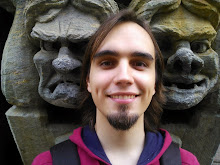If you read today's news in Russia, you would find out that today, October 30, is officially the Day commemorating the victims of political repression. Sixty years ago, had I written about the things I write (and about to write) today, I would have probably been imprisoned and killed. Thirty years ago I would have probably "only" been talking to KGB and having trouble in my everyday life. Awareness of that fact sends chills of self-reflection down my spine.
I remember how on my freshman year in university (2005) I protested against being taught the Lenin's theory of reflection as a foundational worldview in our general psychology class. At the time I was naively into constructivist epistemology and thought that naïve materialism was too ancient to be seriously taught as a basic foundation for general psychology. For me it was like, "Come on, I went through so much trouble and self-sacrifice to get the scholarship; and now what I get is studying Lenin? You gotta be kidding. No, it seems you're not. You're absolutely serious. Oh. My. God." (And that's when my total disillusionment with the Russian academia began. Given the fact that I had almost no illusions regarding the Russian academia, it wasn't coming down to earth, it felt more like coming down six feet under earth altogether.)
I found the imposed ideology to be quite outdated and was sincerely struck by the cruel reality that almost twenty years after the Soviet Union collapsed many of the faculty members still (successfully) tried to teach psychology the way it was taught in the communism-dominated past. That time I just had a "serious talk" with a teacher who strongly advised me against undermining the dominating paradigm as I would get into a big trouble at my exams. I didn't take that too seriously, but still decided not to stir up a hornets' nest and let it go. The point here is: in the early 1980s, I would have probably provoked something bad to happen to me in terms of academic career for such remarks.
Given the cruel history of the totalitarian regime in this country (which itself is grounded in the history of Czarist Russia), no wonder that, historically, Russians have so much trouble of directly and honestly assessing and addressing the problems of the way we currently live. For many decades, survival has depended on one's capacity to doublethink. Truthful self-reflection was a dangerous trait that may have triggered serious anxiety. Through generations this became an unselfconscious cultural norm; and some complex sociocultural defense mechanisms emerged over the centuries to perpetuate the cultural morphic field of this frequency.
Now it pervades the society as a hidden factor; and not many people are actually aware of how this cultural background works in themselves. Most attempts to take a different perspective on life trigger vicious self-defense as the center of developmental gravity in the population seemingly tends to self-defensive and conformist selves (in terms of Susann Cook-Greuter's ego development theory). Instant gratification under the condition of stressful chaotically-changing environment is the dominating mode of discourse in Russian business and politics; and there seems to be no space for complex systems solutions in the Russian mind. Collective reflexology at its best.
Subscribe to:
Post Comments (Atom)




No comments:
Post a Comment